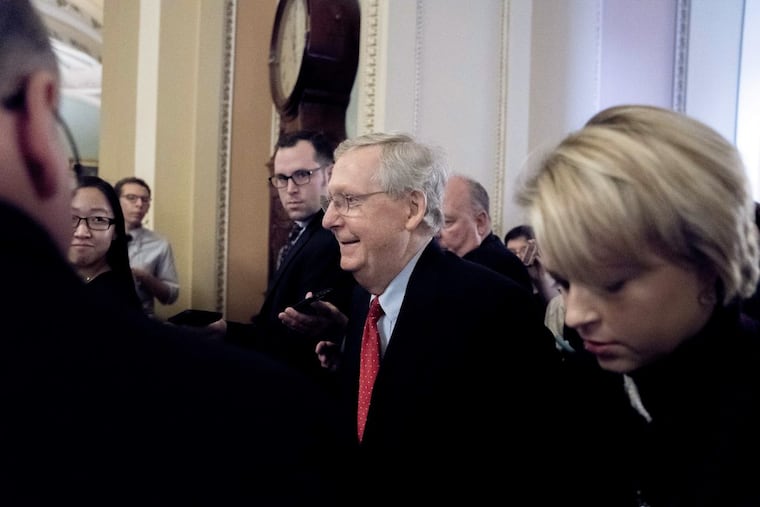GOP tax bills threaten health care for many in Pa., N.J., advocates say
Just months after Congress failed to repeal Obamacare, local advocates are now scrambling to decipher what the GOP tax overhaul plans could mean for the health care of seniors, children and the disabled.

Just months after Congress failed to repeal Obamacare, local advocates are now scrambling to decipher what the GOP tax overhaul plans could mean for the health care of seniors, children and the disabled.
The verdict of the (overwhelmingly Democratic) advocates is grim. The Senate tax bill, which dumps the penalty for those who don't buy health insurance, will swell the ranks of the uninsured. So much so that more than 1,000 Pennsylvania residents a year could die unnecessarily, they declared Tuesday. Nearly 387,000 tax filers in New Jersey could be in dire straits under the House version, which eliminates the itemized deduction for medical expenses.
"The impact of these cuts would be incredible on older Pennsylvanians," Ray Landis, advocacy manager for the state AARP, said in a conference call with reporters on Tuesday. While most Americans do not itemize deductions on their tax returns, people with higher medical expenses, such as seniors, are more likely to do so. An AARP analysis of IRS data found that 311,000 Pennsylvania households deducted an average of $11,000 in 2014. (In New Jersey, 387,000 households deducted an average $8,800.) The analysis did not examine the impact of a GOP plan to change deductions for state and local taxes, which disproportionately affects high-tax states like New Jersey.
The Congressional Budget Office (CBO) last week projected that elimination of the mandate that most people carry health insurance would lead to an additional 13 million uninsured by 2025, and would drive premiums up another 10 percent in 2019 in the exchanges set up by the Affordable Care Act (ACA). Most people who buy insurance on the exchange are eligible for subsidies that increase with premium price. But perhaps 20 percent — and everyone who purchases individual coverage off the exchange — would pay more.
Marc Stier, director of the Pennsylvania Budget & Policy Center, another group on the conference call, pointed to state-by-state impacts of the Senate bill from the Center for American Progress, a left-leaning policy institute. It says that 505,000 more Pennsylvanians would be uninsured in 2025 and average annual premiums for an unsubsidized family of four would rise $2,300 in 2019, not counting other market trends. (Uninsured New Jersey residents would increase by 325,000, with annual premiums up $1,650.)
The biggest worry for health care advocates, however, is what could be coming in later years, especially for Medicaid, the government program for the poorest Americans, including seniors in long-term care. The CBO estimated last week that the Senate bill would add nearly $1.5 trillion to the deficit by 2027, and Republicans have made no secret of their desire to reduce that by cutting entitlement programs. They came close to a historic reduction in Medicaid over the summer in one of several ill-fated versions of Obamacare repeal.
"We're really concerned about what the Senate bill will [mean] when it comes to health care," Maura Collinsgru, health care policy director at New Jersey Citizen Action, said in an interview.
The ACA's Medicaid expansion has vastly increased the availability of treatment for opioid addiction, and the presidential task force that was headed by Gov. Christie said much more is needed. Medicaid also provides health insurance to poor people whose myriad medical problems make them more vulnerable to addiction. In Pennsylvania alone, 124,000 people have received treatment for a substance use disorder since Medicaid was expanded in 2015, said Shelby Kehoe, a youth advocate at Mental Health Partnerships, formerly the Mental Health Association of Southeastern Pennsylvania.
Cutting Medicaid also would harm seniors. New Jersey spends a higher proportion of its Medicaid dollars on the elderly— mainly paying nursing home fees for residents who spent all their savings on medical care — than all but two other states.
Pennsylvania, by contrast, is No. 2 among the states for the proportion of Medicaid that it spends on people with disabilities. Yet thousands of adults with intellectual or developmental disabilities are unable to get coverage, an Inquirer series this week has shown.
Neither state could make up for much lost federal funding, so needy groups — the disabled, elderly, children — would compete for whatever is available. "Eventually, states are going to have to figure out how to cut Medicaid when there is less money," said Antoinette Kraus, director of the Pennsylvania Health Access Network.
A previous version of this story included enrollment numbers released by the Trump administration on Dec. 6 and how they compared with a similar point during the open enrollment season last year. However, last year's numbers included people who had been automatically re-enrolled; this year's did not.